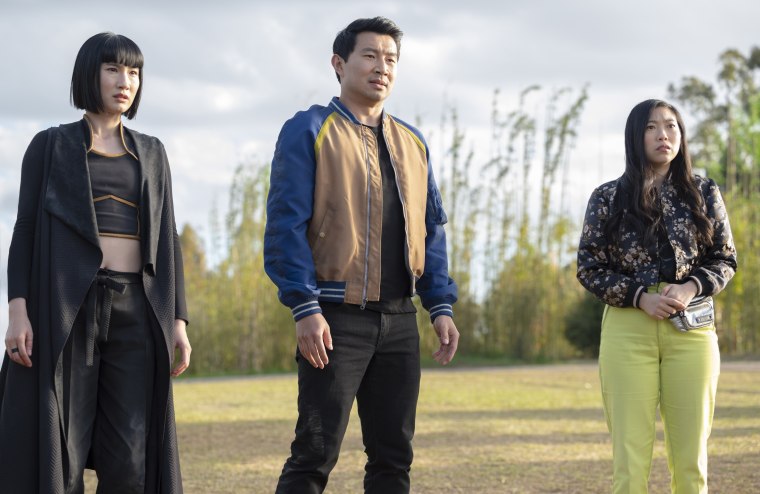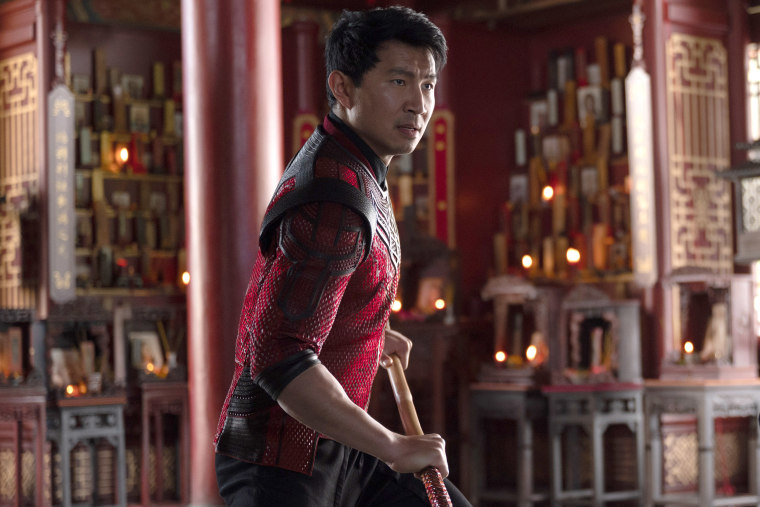Simu Liu — who plays Marvel’s first Asian superhero lead, Shang-Chi, in the upcoming film “Shang-Chi and the Legend of the Ten Rings” — said when it comes to amplifying the stories of marginalized communities, representation behind the camera is just as important as it is on screen.
Liu told NBC Asian America his experience filming the action movie showed him that open communication with writers and producers is “really all it takes” to ensure the authenticity of a film so steeped in Asian and Asian American culture.
“There’s no need to be defensive about it,” Liu said. “There’s no need to panic or pretend like you know the answer when you don’t, because you’ve got such a wonderful cast of actors and actresses and also incredibly talented directors and screenwriters that are all able to contribute, if you would just give them the opportunity, and I think on this movie we absolutely got that opportunity.”
The actor said director Destin Daniel Cretton and screenwriter Dave Callaham, who are both Asian American, were receptive to his feedback, as well as the perspectives of Awkwafina, who plays Shang-Chi’s ride-or-die friend Katy, and Ronny Chieng, who plays Jon Jon, a club promoter of sorts.
“[It] all directly impacted the way that our story was told and allowed it to be told with the level of nuance and authenticity that it has been,” he said.
Liu also said it's important for non-Asians working on movies and TV shows to ask questions.
"To have the humility, to kind of defer and to say, 'We don’t necessarily know the answer, and we need you to help us,' I think that was so critically important in us being able to provide our thoughts, our perspectives on the story," Liu said.

Cretton said input from the actors helped shape their characters. For example, through differences in dialogue, the movie makes distinctions between the Asian and Asian American characters, such as Katy, a born-and-bred San Franciscan; Shang-Chi’s sister Xialing, a underground fighter who remained in Asia, played by Meng’er Zhang; and, of course, Shang-Chi, who inhabits the in-between of those two worlds.
“What really helped us in defining these different backgrounds for these characters was casting actors who fully understood their characters ... and seeing who really understands what it means to have one foot in Western culture and one foot still in Chinese culture,” Cretton said. “Awkwafina really understands what it means to be an Asian American. Once we were into the scenes with Tony Leung and [Zhang], it was a constant education as to the differences between mainland Chinese and Chinese Americans.”
Liu, who starred in the Canadian sitcom “Kim’s Convenience,” has previously spoken out about what happens with there’s not enough representation in writer’s rooms and behind the camera. In a since-removed Facebook post in June, he called out the lack of East Asian writers on the show and its unwillingness to accept creative input from Asian talent.
He also made headlines for alleging that core Asian cast members on the show were paid a “horsepoop rate.” While lead actors traditionally get more input as the seasons commence, “this was not the case on our show.”
Research has shown that Hollywood’s depictions of Asian Americans have suffered from the lack of proper representation behind the camera.
In a study by the Annenberg Inclusion Initiative at the University of Southern California released this year, researchers evaluated portrayals of the Asian American and Pacific Islander community by looking at 79 primary and secondary AAPI characters across the top films of 2019.
They found that most characters fell into the stereotypical categories of "silenced, stereotyped, tokenized, isolated, and sidekicks/villains." Other tropes, including the emasculation of Asian men, also remained, with 58 percent of Asian men shown with no romantic partners. Roughly 38 percent of Asian women, in contrast, were portrayed similarly.
Films with AAPI directors or producers, however, led to different results for those in front of the camera. The study showed that these movies featured more AAPI leads than those without and that AAPI directors and casting directors cast more AAPI actors in speaking roles than non-Asian directors and casting directors did.
Marvel has previously been criticized for the way the studio has handled Asian characters and storylines. When Marvel cast Tilda Swinton, a white actress, as The Ancient One in the 2016 movie "Doctor Strange," Asian Americans pushed back. They pointed out that in the source material the character is a Tibetan man and called it another example of Hollywood whitewashing Asian characters. Marvel Studios President Kevin Feige told Men’s Health in May that looking back, he regrets the decision.
“We thought we were being so smart, and so cutting-edge,” Feige said at the time. “We’re not going to do the cliché of the wizened, old, wise Asian man. But it was a wake-up call to say, ‘Well, wait a minute, is there any other way to figure it out? Is there any other way to both not fall into the cliché and cast an Asian actor?’ And the answer to that, of course, is yes.”
